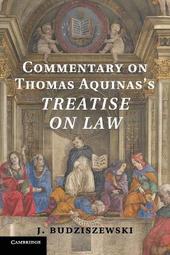
|
Commentary on Thomas Aquinas's Treatise on Law
Paperback / softback
Main Details
| Title |
Commentary on Thomas Aquinas's Treatise on Law
|
| Authors and Contributors |
By (author) J. Budziszewski
|
| Physical Properties |
| Format:Paperback / softback | | Pages:520 | | Dimensions(mm): Height 230,Width 153 |
|
| Category/Genre | Western philosophy - Medieval and Renaissance c 500 to c 1600
Social and political philosophy |
|---|
| ISBN/Barcode |
9781316609323
|
| Classifications | Dewey:340.1 |
|---|
| Audience | | Professional & Vocational | | Tertiary Education (US: College) | |
|---|
|
Publishing Details |
| Publisher |
Cambridge University Press
|
| Imprint |
Cambridge University Press
|
| Publication Date |
29 September 2016 |
| Publication Country |
United Kingdom
|
Description
Natural moral law stands at the center of Western ethics and jurisprudence and plays a leading role in interreligious dialogue. Although the greatest source of the classical natural law tradition is Thomas Aquinas's Treatise on Law, the Treatise is notoriously difficult, especially for nonspecialists. J. Budziszewski has made this formidable work luminous. This book - the first classically styled, line-by-line commentary on the Treatise in centuries - reaches out to philosophers, theologians, social scientists, students, and general readers alike. Budziszewski shows how the Treatise facilitates a dialogue between author and reader. Explaining and expanding upon the text in light of modern philosophical developments, he expounds this work of the great thinker not by diminishing his reasoning, but by amplifying it.
Author Biography
J. Budziszewski is a Professor of Government and Philosophy at the University of Texas, Austin. He also teaches courses in the religious studies department and in the law school, and he maintains a personal scholarly website, www.undergroundthomist.org. Dr Budziszewski has published widely in both scholarly journals and magazines of broader readership. His books include The Resurrection of Nature: Political Theory and the Human Character (1986), The Nearest Coast of Darkness: A Vindication of the Politics of Virtues (1988), True Tolerance: Liberalism and the Necessity of Judgment (1992), Written on the Heart: The Case for Natural Law (1997), winner of a Christianity Today book award in 1998, The Revenge of Conscience: Politics and the Fall of Man (1999), What We Can't Not Know: A Guide (2003), Evangelicals in the Public Square: Four Formative Voices (2006), Natural Law for Lawyers (2006), The Line Through the Heart: Natural Law as Fact, Theory, and Sign of Contradiction (2009) and On the Meaning of Sex (2012).
Reviews'In this much-needed contribution to the lively debates that currently rage about natural law theory, Budziszewski provides a superb line-by-line commentary on the complete text of Aquinas' Treatise on Law - the first complete commentary of this sort in centuries. The Commentary offers insightful comments on the implications of modern philosophical developments for interpreting and evaluating the positions taken by Aquinas. An enormously valuable text, not only for scholars specializing in the field but also for those just embarking on a careful study of the work.' Fr. Joseph W. Koterski, S.J., Fordham University, New York 'Budziszewksi's depth and clarity make this commentary on St Thomas an indispensable tool for student, teacher and scholar. Providing an overall context for each question, then pairing his own paraphrase with the translation of the Dominican Fathers, Budziszewski proceeds to comment in detail on each objection, sed contra, answer and reply to objection. The important yet difficult Treatise on Law is laid open to our full view by Professor Budziszewski - clearly the fruit of many years of close study.' John Hittinger, University of St Thomas, Houston 'No area of public life is more confused than law and what it is. In this context, few books could be more significant than a complete, accurate and thorough reading and rereading of Aquinas' famous Treatise on Law. Budziszewski has performed an enormous service to intelligence and to clarity of public order in providing this detailed, yet readable and intellectually profound, commentary. It is a demanding book about a demanding topic, one that has been left too long unexamined in the tradition of Aquinas.' James V. Schall, S.J., Professor Emeritus, Georgetown University, Washington DC
|